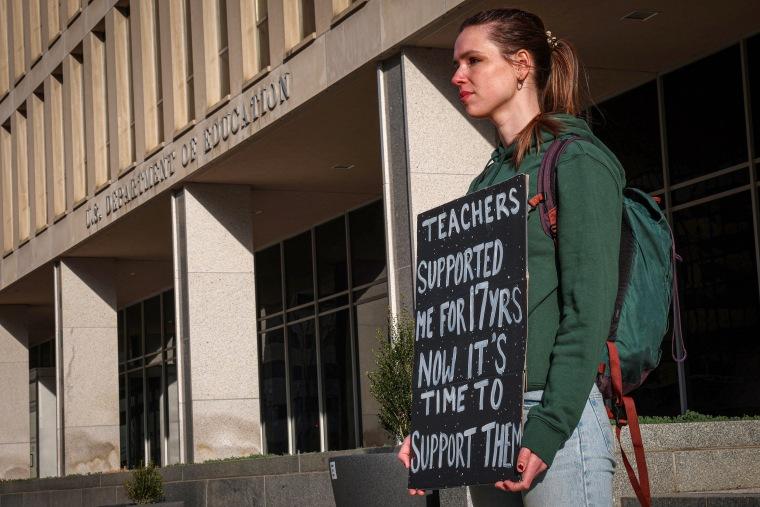U.S. Education Department Layoffs Threaten Civil Rights Enforcement Nationwide, With Chicago Hardest Hit
Recent reductions in staffing at the U.S. Department of Education have severely weakened civil rights offices,particularly in Chicago and other major urban centers. These layoffs have slashed personnel dedicated to upholding anti-discrimination laws that protect students from inequities related to race, gender, disability, and other protected categories. As a result, the capacity to investigate complaints and enforce educational equity has been compromised, sparking alarm among educators, civil rights advocates, and community leaders.
Chicago’s diverse student body depends heavily on vigilant oversight to ensure fair treatment and equal access to educational resources. Though, with nearly 40% of civil rights staff positions eliminated, investigations are delayed, and support services for marginalized students have diminished. This trend threatens to reverse years of progress in combating systemic discrimination within public schools.
Impact of Workforce Reductions on Civil Rights Enforcement
The layoffs have led to a significant decline in the enforcement of policies designed to prevent discrimination in schools. Key consequences include:
- Slower resolution of civil rights complaints,creating a growing backlog nationwide
- Reduced outreach and support for students from historically underserved communities
- Challenges in addressing entrenched inequities,such as disproportionate disciplinary actions and unequal access to advanced coursework
| Region | Percentage of Staff Cuts | Average Case Backlog (Months) |
|---|---|---|
| Chicago | 38% | 6 |
| Midwest | 34% | 5 |
| National Average | 37% | 7 |
Repercussions for Students of Color and Equity Programs
Students of color,who have historically relied on robust civil rights protections to access equitable education,are now facing increased vulnerabilities. The reduction in staff undermines efforts to combat discriminatory practices such as biased disciplinary measures, inequitable resource distribution, and obstacles to enrollment in advanced classes.
Moreover, critical equity initiatives-such as culturally responsive pedagogy, support for English language learners, and inclusive curriculum advancement-are jeopardized by the shrinking workforce. The consequences include:
- Investigation Delays: Longer wait times and less thorough responses to civil rights complaints
- Community Engagement Decline: Fewer opportunities for families from diverse backgrounds to collaborate with education officials
- Reduced Professional Development: Limited training for educators on implicit bias and inclusive teaching practices
| Area Affected | Likely Outcome |
|---|---|
| Complaint Investigations | Prolonged or inadequate handling of discrimination cases |
| Student Support Services | Decreased wraparound assistance for at-risk students |
| Teacher Training Programs | Fewer sessions focused on equity and diversity |
Evaluating Federal Commitment to Civil Rights Enforcement After Layoffs
The recent staffing cuts have raised serious questions about the federal government’s dedication to enforcing civil rights protections in education. Particularly in cities like Chicago, New York, and Atlanta, the reduction in personnel has diminished the ability to proactively address discrimination and ensure compliance with federal laws.
Key functions at risk include:
- Monitoring adherence to civil rights statutes across school districts
- Investigating allegations of racial, gender, and disability discrimination
- Providing technical support to schools striving to meet legal requirements
- Engaging families and communities to raise awareness of students’ rights
As these essential activities contract, the risk grows that longstanding gains in educational equity will erode.
| Office Location | Staff Reduction (%) | Effect on Operations |
|---|---|---|
| Chicago | 40% | Investigation delays |
| New York | 35% | Cutbacks in outreach programs |
| Los Angeles | 30% | Reduced complaint intake capacity |
| Atlanta | 45% | Growing case backlog |
Recommendations for Rebuilding and Enhancing Civil Rights Protections in Education
To address the critical gaps created by these layoffs, immediate and strategic action is necessary. Prioritizing the restoration of civil rights staff is essential to reinstate effective oversight and enforcement. Beyond rehiring, investing in thorough training will empower officers with modern tools to identify and combat discrimination effectively.
Strengthening partnerships with local organizations can also expand the department’s reach, ensuring that complaints are addressed promptly and communities remain informed. Transparency and accountability must be central to reform efforts, including the creation of a publicly accessible database tracking civil rights complaints and resolutions.
- Boost Funding: Secure dedicated resources for civil rights enforcement activities within education.
- Simplify Complaint Procedures: Make reporting discrimination easier and more accessible for students and families.
- Empower Regional Offices: Provide local units with greater autonomy to respond swiftly to urgent issues.
- Conduct Regular Audits: Implement systematic reviews of school districts’ compliance with civil rights laws.
| Proposed Action | Anticipated Benefit |
|---|---|
| Rehiring Laid-Off Staff | Restore investigative and enforcement capacity |
| Enhancing Data Transparency | Build public trust and enable external oversight |
| Community Collaboration Initiatives | Improve outreach and complaint reporting |
| Updating Policies and Training | Increase efficiency and effectiveness of responses |
Looking Ahead: Safeguarding Educational Equity Amidst Challenges
The ongoing reductions in civil rights staffing within the U.S. Department of Education pose a significant threat to the enforcement of equity in schools nationwide. Particularly in diverse urban centers like Chicago, these cuts risk leaving marginalized students without the protections they need to thrive academically and socially. As the department navigates budgetary constraints, the coming months will be critical in determining whether the federal government recommits to its civil rights mission or allows progress to stall amid growing educational disparities.





